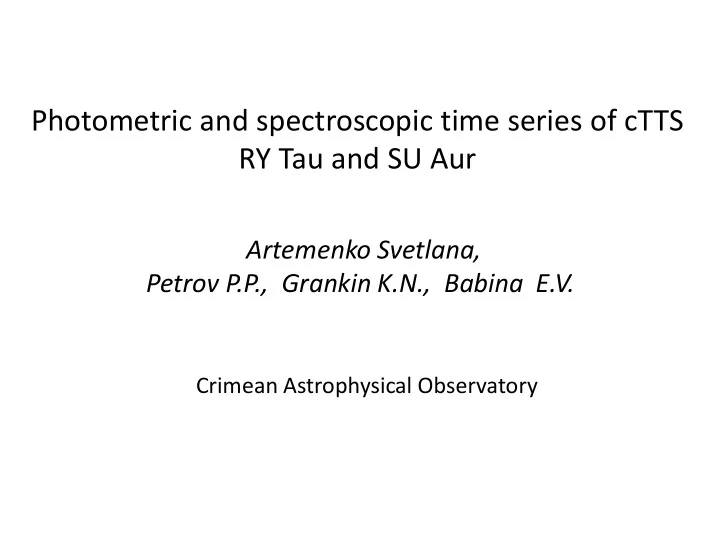

Photometric and spectroscopic time series of cTTS RY Tau and SU Aur Artemenko Svetlana, Petrov P.P., Grankin K.N., Babina E.V. Crimean Astrophysical Observatory
In classical T Tauri stars (cTTS) variations in the emission line profiles reflect the gas flows – accretion and winds. We carry out long series of simultaneous spectroscopic and photometric observations of two cTTS, RY Tau and SU Aur, with the aim to quantify the accretion and outflow dynamics at time scales from days to years.
Magnetospheric accretion and outflows in cTTS Typically, there is a combination of dipole and octupol, but the DIPOLE truncates the disk. Rm Rcor Romanova&Owoki, 2015 Unstable accretion: Rm < 0.7 Rcor The most unstable MHD processes take place at the boundary between the inner disk and stellar magnetosphere (Zanni & Ferreira, 2013) "If CTTSs undergo solar-like magnetic cycles, we would expect cycles to exist in the position of the inner edge of the accretion disc and the locations of accretion footpoints." (Johnstone et al, 2014) P roblem : Whether magnetic cycle affects the accretion and wind processes in a cTTS and can we reveal a magnetic cycle by monitoring the dynamics of accretion/wind flows?
SU Aur and RY Tau are intermediate mass objects with radiative core and convective shell RY Tau SU Aur L = 13 10 L ʘ M = 2.1 1.9 M ʘ Age = 4.7 6.6 Myr M accr ≈ 4 ·10 -9 M ʘ yr -1 Sp = G2IV T eff = 5945 K Optical veiling < 0.1 The photospheric line depths remain unchanged at different stellar brightness. The optical light variability is solely due to the circumstellar dust.
RY Tau: lightcurves and moments of spectral observations
RY Tau: variability of H α profile in six seasons of 2013-2018 2013 2018 2015 2017 2014 2016
Flux = (I λ – 1) x 10 -0.4x(V-10) Flux unit = 3.67 x 10 -13 erg cm -2 s -1 Å -1 Flux profiles Flux variance profiles
The main result: variations of the wind activity in RY Tau. Variance of H α emission flux in 2013-2019
SU Aur : variability of H α profile in four seasons of 2015-2019 2015 2018 2017 2016
SU Aur, H α flux profiles 2015-2016 2016-2017 2017-2018 2018-2019
SU Aur: in the quiescent state (2016) the wind feature has almost disappeared for two months, at minimal circumstellar extinction EW ≈ 3.5 Å M accr ≈ 10 -9 No wind, no dust?
CONCLUSIONS If there is a magnetic cycle in RY Tau, it may be around 6 years. In order to confirm this result, we plan to continue the series for at least two years more. In SU Aur we observe alternation of high and low activity on a time scale of two years. During the quiescent state the outflow became extremely weak for a period of two months. In both stars the optical light variability is solely due to the circumstellar dust. This research was partially supported by the grant RSI № 19 -72-10063
2016 AstL 42 193 Wind dynamics and circumstellar extinction variations in the T Tauri star RY Tau Babina, E. V.; Artemenko, S. A.; Petrov, P. P. 2019 MNRAS 83 32 Dynamics of wind and the dusty environments in the accreting T Tauri stars RY Tauri and SU Aurigae Petrov, P. P.; Grankin, K. N.; Gameiro, J. F.; Artemenko, S. A.; Babina, E. V.; Albuquerque, R. M. G. de; Djupvik, A. A.; Gahm, G. F.; Shenavrin, V. I.; Irsmambetova, T. R.; Fernandez, M.; Mkrtichian, D. E.; Gorda, S. Yu.
Thank you!
Recommend
More recommend